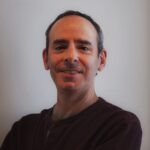“In order to effectively combat climate change and live more sustainably, our attitude must be mutzav artza, firmly grounded in the land.”
This week’s Torah portion of Vayetze offers us a rare opportunity to glimpse into the mind of a tzaddik,
Jacob our forefather, enabling us to draw vital lessons about the balanced relationships among ourselves, the land, and God. This is a lesson that we can distill from the shmita year as well. In the case of this week’s parsha, the clues are all there in the account of the dream:
- The ladder, firmly set in the land (mutzav artza), its top reaching skyward;
- Angels ascending and descending the ladder like messengers carrying righteous intents and actions between earth and heaven;
- Jacob waking from his sleep, saying, “God is in this place (makom), and I did not know it (v’anochi lo yadati)” (Genesis 28:12-16).
One relevant facet of the dream can be found through an interpretation offered by Dr. Michael Fishbane.
In his book, Sacred Attunement, Dr. Fishbane describes the ladder as not only based on land, but also in
people: Jacob’s ladder “ascending from the inner heart (and common world)”. A symbolic merging
between people and earth rings true on multiple levels: in the context of theological mindfulness, as
connection with common primordial roots in the biblical creation story and the Garden of Eden, and as
an alignment of practical interests.
Rabbi Pinchas Horowitz offers a second relevant commentary, on v’anochi lo yadati. He notices a
grammatical idiosyncrasy in the text. “I” is mentioned twice: V’anochi meaning “and I”, and lo yadati
which means “I did not know”. With this in mind, the translation reads, “and I, I did not know”. For
Horowitz, this statement signifies that Jacob has forgotten himself. This humble transcendence of his own egocentrism is according to Rabbi Horowitz what enables Jacob to discover God’s presence in the land around him.
What can we learn from Jacob in this text to apply to our lives especially in this shmita year? In order to effectively combat climate change and live more sustainably, our attitude must be mutzav artza, firmly grounded in the land. Our intentions and actions may then, like angels, heal the lithosphere below our feet, and the troposphere above.
This requires us to awaken to our true nature. We must be woken up to our self-centeredness and its consequences. We must transcend egocentrism to arrive at a more geocentric attitude. In doing so, Jacob’s dream awakens us to a new makom. A place of proper relationship among people, earth, and heaven. And God is in it.
 Allen Katz, MD was born and raised in the suburbs of Chicago, Illinois. He is a lifelong learner of Jewish studies. Presently he facilitates his synagogue’s Mussar group and their year long shmita class series. He also writes a weekly blog called Derech Eretz in which he advocates stronger orientation to the earth based in Jewish ethics & scriptures. Dr. Katz lives in Boulder, Colorado.
Allen Katz, MD was born and raised in the suburbs of Chicago, Illinois. He is a lifelong learner of Jewish studies. Presently he facilitates his synagogue’s Mussar group and their year long shmita class series. He also writes a weekly blog called Derech Eretz in which he advocates stronger orientation to the earth based in Jewish ethics & scriptures. Dr. Katz lives in Boulder, Colorado.